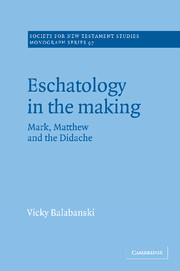Book contents
- Frontmatter
- Contents
- Preface
- List of abbreviations and note on texts
- Introduction
- 1 An imminent End? Models for understanding eschatological development in the first century
- 2 Matthew 25:1–13 as a window on eschatological change
- 3 Mark 13: eschatological expectation and the Jewish War
- 4 The Judean flight oracle (Mark 13:14ff) and the Pella flight tradition
- 5 Matthew 24: eschatological expectation after the Jewish War
- 6 Didache 16 as a development in Christian eschatology
- Conclusion
- Bibliography
- Index of modern authors
- Index of biblical and other ancient texts
- Subject index
6 - Didache 16 as a development in Christian eschatology
Published online by Cambridge University Press: 04 September 2009
- Frontmatter
- Contents
- Preface
- List of abbreviations and note on texts
- Introduction
- 1 An imminent End? Models for understanding eschatological development in the first century
- 2 Matthew 25:1–13 as a window on eschatological change
- 3 Mark 13: eschatological expectation and the Jewish War
- 4 The Judean flight oracle (Mark 13:14ff) and the Pella flight tradition
- 5 Matthew 24: eschatological expectation after the Jewish War
- 6 Didache 16 as a development in Christian eschatology
- Conclusion
- Bibliography
- Index of modern authors
- Index of biblical and other ancient texts
- Subject index
Summary
As the final aspect of this study, let us now turn our attention to the eschatological traditions preserved in the last section of the Didache, chapter 16. In examining this material, I hope to be able to gain some clues as to the factors influencing the development of eschatology in the early church. The passage in question reads as follows:
1. Γρηγορεῖτε ὑπὲρ τῆς ζωῆς ὑμῶν̇ οἱ λύχνοι ὑμῶν μὴ σβεσθήτωσαν, καὶ αἱ ὀσφύς ὑμῶν μὴ ἐκλυέσθωσαν, ἀλλὰ γίνεσθε ἕτοιμοι̇ οὐ γὰρ οἴδατε τὴν ὥραν, ἐν ᾗ ὁ κύριος ἡμῶν ἕρχεται. 2. πυκνῶς δὲ συναχθήσεσθε ζητοῦντες τὰ ἀνήκοντα ταῖς ψυχαῖς ὑμῶν̇ οὐ γὰρ ὠφελήσει ὑμᾶς ὁ πᾶς χρόνος τῆς πίστεως ὑμῶν, ἐὰν μὴ ἐν τῷ ἐσχάτῷ καιρῷ τελειωθῆτε. 3. ἐν γὰρ ταῖς ἐσχάταις ἡμέραις πληθυνθήσονται οἱ ψευδοπροφῆται καὶ οἱ φθορεῖς, καὶ στραφήσονται τὰ πρόβατα εἰς λύκους, καὶ ἡ ἀγάπη στραφήσεται εἰς μῖσς. 4. αὐξανούσης γὰρ τῆς ἀνομίας μισήσουσιν ἀλλήλους καὶ διώξουσι καὶ παραδώσουσι, καὶ τότε φανήσεται ὁ κοσμοπλανὴς ὡς υἱὸς θεοῦ καὶ ποιήσει σημεῖα καὶ τέρατα, καὶ ἠ γῆ παραδήσεται εἰς χεῖρας αὐτου, καὶ ποιήσει ἀθέμιτα, ἃ οὐδέποτε γέγονεν ἐξ αἰῶνος. 5. τότε ἥξει ἡ κτίσις τῶν ἀνθρώπων εἰς τὴν πύρωσιν τῆς δοκιμασίας, καὶ σκανδαλισθήσονται πολλοὶ καὶ ἀπολοῦνται, οἱ δὲ ὑπομείναντες ἐν τῇ πίστει αὐτῶν σωθήσονται ὑπ̓ αὐτοῦ τοῦ καταθέματος. 6. καὶ τότε φανήσεται τὰ σημεῖα τῆς ἀληθείας̇ πρῶτον σημεῖον ἐκπετάσεως ἐν οὐρανῷ, εἶτα σημεῖον φωνῆς σάλπιγγος, καὶ τὸ τρίτον ἀνάστασις νεκρῶν̇ 7. οὐ πάντων δὲ, ἄλλ̓ ὡς ἐρρέθη̇ Ἣξει ὁ κύριος καὶ πάντες οἱ ἅγιοι μετ̓ αὐτοῦ. […]
- Type
- Chapter
- Information
- Eschatology in the MakingMark, Matthew and the Didache, pp. 180 - 205Publisher: Cambridge University PressPrint publication year: 1997

